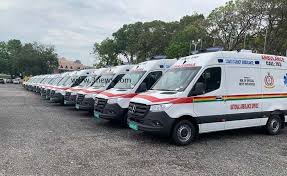Greater Accra Struggles with Limited Emergency Resources — Only 42 Ambulances Available

The Head of Dispatch for the Ghana National Ambulance Service in the Greater Accra Region, Joyce Avadzinu, has revealed that emergency medical response in the region is under intense pressure due to a serious shortage of operational ambulances.
Currently, only 42 ambulances are actively serving the entire Greater Accra Region—a densely populated and high-demand area. This limited number has left dispatchers struggling to respond swiftly to emergencies, often having to make difficult choices about which cases warrant immediate attention.
In an interview with Citi News, Ms. Avadzinu described the daily challenges of managing emergency calls with such constrained resources. She explained that, more often than not, many of the available ambulances are already engaged when new emergency requests come in, making it necessary to triage cases based on severity.
“We are doing our best under the circumstances, but with only 42 ambulances covering the whole region, most of the time they are already attending to cases when fresh calls are received,” she noted. “In such situations, if a patient is being transferred between hospitals and their condition is stable, we may have to delay the response to ensure we have units available for more severe emergencies.”
Ms. Avadzinu pointed out that dispatchers are constantly juggling limited resources while ensuring that patients facing life-threatening situations—such as road traffic accidents or sudden medical collapses—are prioritized for immediate response.
“We always try to keep a few ambulances on standby for the most critical emergencies,” she added. “So even as we dispatch others to attend to routine cases, we are coordinating closely with our field teams to ensure that once an ambulance returns, it is ready to be deployed again quickly.”
This precarious system, while effective to some degree, is not sustainable in the long term, especially in a rapidly growing urban area like Greater Accra where demand for emergency services continues to rise.
Emergency health professionals and stakeholders have consistently raised alarms about the lack of adequate emergency vehicles in the country. Despite investments in the sector, maintenance issues, aging fleets, and the lack of replacements have significantly hampered progress.
The challenge is not just the number of ambulances but also ensuring that those available are properly maintained, fueled, and staffed with trained medical personnel.
Public health experts warn that the current situation compromises the quality of care, especially in time-sensitive medical emergencies where every minute can mean the difference between life and death.
Ms. Avadzinu’s remarks also highlight the psychological burden on dispatch staff, who must make tough decisions daily under immense pressure, knowing that a delayed response could cost lives.
“As dispatchers, we are always under pressure,” she stated. “It’s not easy telling a caller that they have to wait when they are in distress, but that’s the reality we are dealing with. We hope that more resources can be allocated to improve the situation.”
Calls have intensified for the government and private sector to invest in expanding and modernizing the ambulance fleet across the country, particularly in urban hubs like Accra, where traffic congestion and population density make rapid response a challenge even with a full complement of vehicles.
Until then, frontline responders like Ms. Avadzinu and her team continue to manage with limited resources, relying on their training, coordination, and professionalism to provide critical care to those in need.






